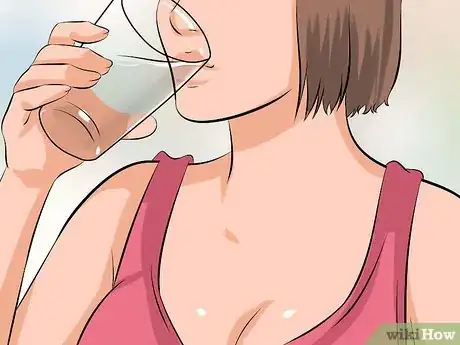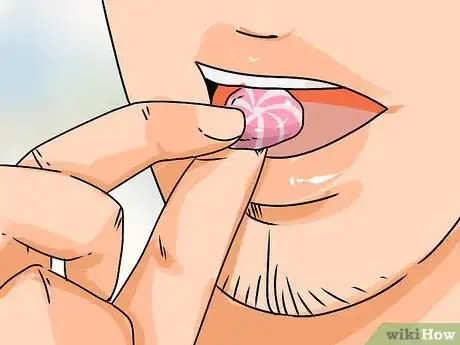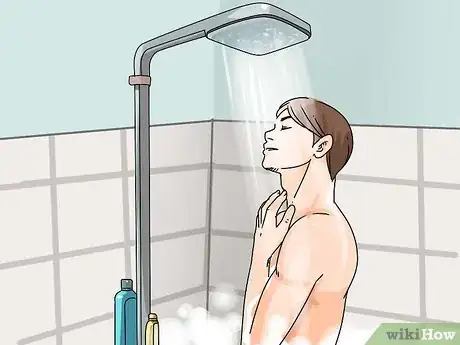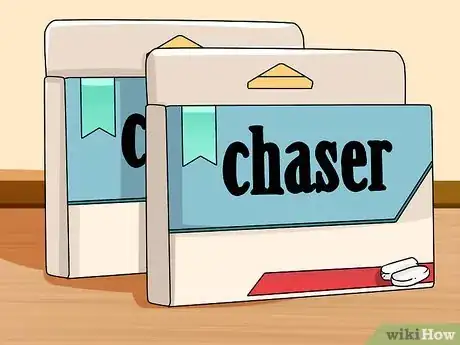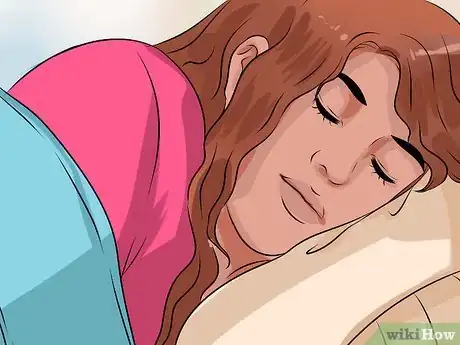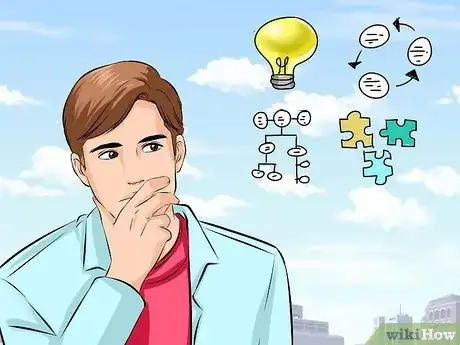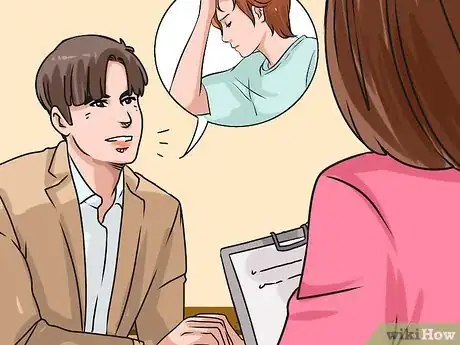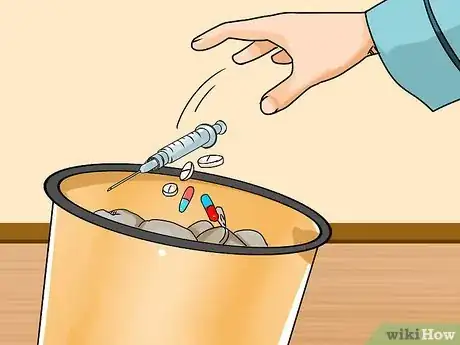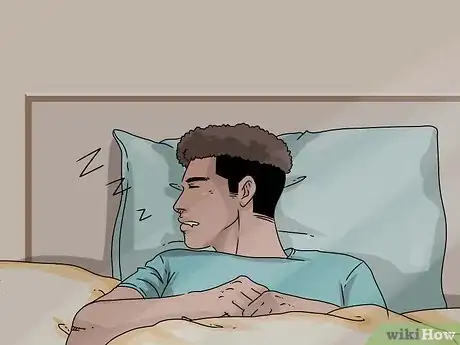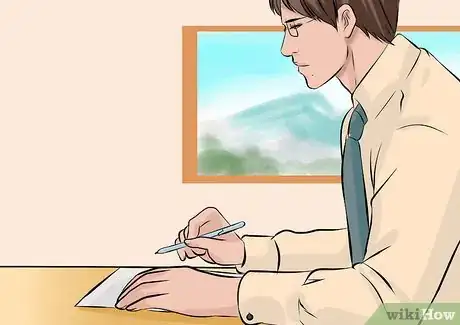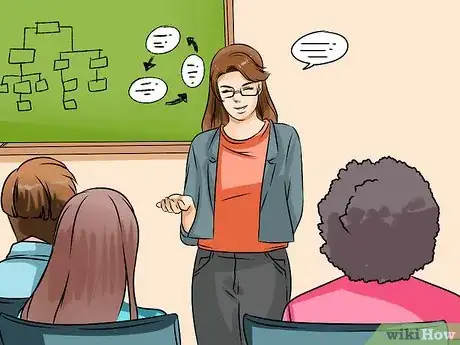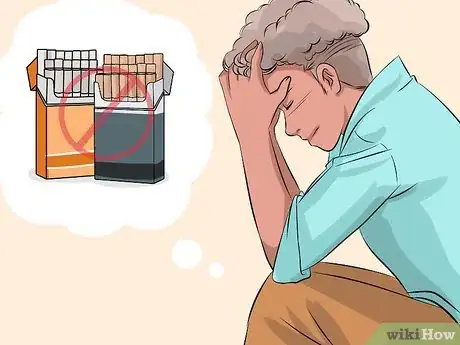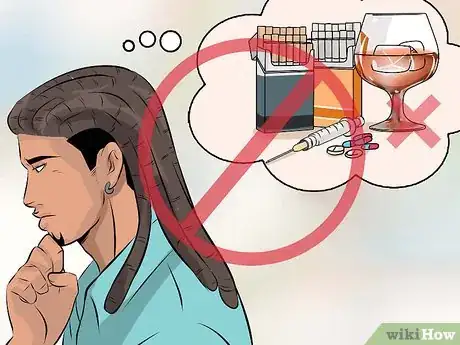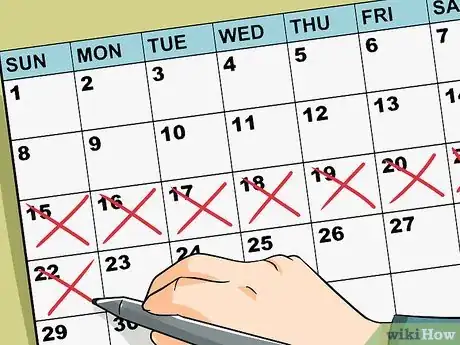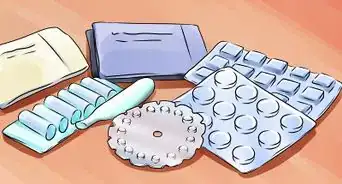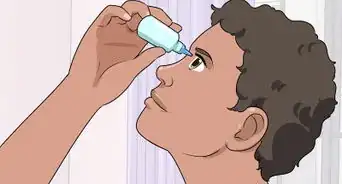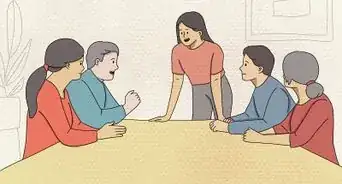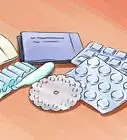This article was co-authored by Tala Johartchi, PsyD. Dr. Tala Johartchi is a Clinical Psychologist based in the Los Angeles, California metro area. With expertise and advanced training in Evidence-Based Practices and therapeutic/behavioral frameworks, Dr. Johartchi specializes in working with individuals, couples, and families experiencing Substance Disorders, Love Addiction and Codependency, Post Traumatic Stress Disorder, as well as common co-occurring disorders such as Depression, Anxiety, and Relational/Attachment difficulties. She earned an MA and PsyD in Clinical Psychology from The American School of Professional Psychology at Argosy University, San Francisco.
There are 11 references cited in this article, which can be found at the bottom of the page.
This article has been viewed 81,404 times.
If you're tired of having the foot of drugs or alcohol standing on your throat, you can learn how to crawl out from under. Getting sober means fighting the good fight: cleaning up your body and your mind, learning to control the cravings that once controlled you. Whether you're a chronic user or have just had a few too many, you can learn how to get sober and start down the road to recovery.
Steps
Sobering Up Quickly
-
1Drink water. If you're too inebriated and you need to sober up quickly, the best way to do it is to stop drinking or using immediately, and try to get hydrated. Whatever's got your head spun, water will help to get it straighter.
- Splash some cold water on your face, as well, especially if you're on something other than booze. If you're on a downer, this can help to wake you up and sharpen your senses.
- Try sports drinks high in electrolytes, which can help to get you a little sharper, replacing the electrolytes and potassium that drinking leeches from your body.
-
2Eat something high in fructose. It's important to eat something, anything, if you want to sober up quickly. And if you're drunk, eating some foods high in fructose can actually help lower your blood-alcohol levels significantly, compared with other foods.[1] Eating some sugary cereal, drinking a Coke, or some other fruity candy can help to sober you up.
- It's a common misconception that eating bread or other carbs when you're drunk "absorbs" the alcohol in your stomach. Alcohol is absorbed into the bloodstream very quickly, and carbs only help to prevent drunkenness if you consume them before drinking.
- Avoid especially fatty foods if you're trying to sober up. Greasy pizza or burgers will end up dehydrating you more, in the end, and interrupt your sleep.[2]
Advertisement -
3Use coffee for some highs and avoid it for others. Depending on what's got you bent, coffee can be a positive or a negative influence. In short, avoid it if you're drunk, and have some if you're high, but only if it sounds good.
- It's a common misconception that drinking a cup of black coffee helps to sober you up if you've had a few too many beers. Not true.[3] Caffeine further dehydrates you, can impair judgment, and make it difficult to sleep eventually.
- If you're too high on downers or psychedelics, having a cup of coffee can help sober you up and give you some sharpness, depending on your temperament. If you're experiencing serious anxiety and feeling panicky, a cup of coffee could make it worse.
- Never take caffeine to sober up if you're high on amphetamines, cocaine, or other up-drugs. It'll just make it worse.
-
4Take a shower. Cold showers are a good idea for sobering up, whatever you're messed up on. While it won't make your body process alcohol more quickly, it can help to mask the smells related to being inebriated, and help you sharpen your mind and wake up a little bit.
- If you're really high, taking a cold shower can also help to give you a rope back into the real world. Just going through the routine of washing will help you feel more normal.
-
5Get a "Sober Up" pill if you're drunk. Available at some health food stores, herbal lozenges with names like "Sober Up" or "Chaser" are often marketed as hangover pills, and can be used with some measure of success when you're still messed up and trying to get a clear head.[4]
- The efficacy of these pills is often super various. Avoid the effervescent tablets that are little more than aspirin and caffeine, and focus on herbal supplements to see what works.
-
6Sleep. The most reliable and effective way of getting sober is to always give it time and to sleep it off. Your body processes alcohol and drugs through the blood stream at its own rate, and it's pretty difficult to affect that without giving it time. Whatever you're feeling, high or drunk, drink a big glass of water and go to sleep.
- Don't, under any circumstances, mix sleep aids with other drugs or alcohol. If you're feeling really high or drunk, stop adding new substances to the mix, or you risk combinations that can make you sick.
-
7Call a cab. If you're reading this article because you're trying to sober up quickly to drive home, find another plan. These tricks mostly involve ways to get yourself feeling more normal and in control of your faculties, helping you avoid bad hangover symptoms the next day, but that doesn't mean you're going to pass a breathalyzer test right now. Finding a couch and crashing on it is the best way to get sober. Drive home in the morning, if you have to, or pay for a cab now and avoid the risk.
Quitting for Good
-
1Come up with a plan. If you're tired of using and want to get sober, it's good to strategize. For some people, quitting cold turkey is the best method, while others will need to negotiate more with their drug of choice. It's not appropriate for everyone to "just stop" all of a sudden, which can be a drastic shock to your system, and can be quite dangerous, depending on the drug you may be using.[5]
- If you're an alcoholic, get checked out by a doctor. Chronic users of alcohol run the risk of delirium tremens and serious health concerns, including cardiac arrest, if you suddenly stop using completely. Tapering down and using prescription medication is sometimes the best way to detox.
- If you're addicted to opiates, it's important to get checked out by a doctor and consider "warm turkey" methods, using prescription medication to come off more slowly.
-
2Pick a date to quit for good. It's helpful for a lot of addicts to pick a date at some point in the future, pencil it in, and quit when the day rolls around. Whether it's next week, a few weeks from now, or the end of the year, pick a significant date and plan on sticking to it.
- Setting a date helps addicts to taper down and start dealing with the psychological issues of getting sober more slowly. It makes it simpler than saying you'll quit "Sometime in the future" or "Maybe next year."[6]
-
3Start tapering your usage. Whatever you're addicted to, it's important to start using less and less before you try to get completely sober. Start tapering as soon as you decide to start quitting, and continue tapering as much as possible up to the quit date. Withdrawal symptoms will be much less severe if you taper.
- If you consume a certain amount every night, try spreading it over two nights instead. See how you feel. Eventually, try making that amount last three days when you feel up to it.
- Learn the "ten minute delay." When you feel a craving coming on, just tell yourself that you have to wait ten minutes to take it. Do other things. Distract yourself. At the end of ten minutes, see if you're still as desperate for it as before. Give it another ten minutes, if you can.
- It's important to avoid using "tapering" as a psychological defense. If you postpone quitting because you're still "tapering," (but you're actually not) then you're not moving forward with your plan. It's important to be realistic, if you want to get sober.
-
4Talk to a doctor about managing withdrawal. Different drugs come with different side effects and health concerns, while your body detoxifies. Depending on what you're trying to quit, there may be prescription help out there for you, to come down more slowly and to ease off the drug at a gradual pace. Anti-anxiety medications and antidepressants are sometimes effective at helping you manage cravings and get through the difficult withdrawal period.
- If you're addicted to opiates, consider using suboxone/subutex to ease off. It's more widely available, and often cheaper and easier to get than methadone, which comes with a host of secondary addiction problems. Both are effective treatments, however.
- If you're addicted to alcohol, often naltrexone and other drugs will be prescribed, which create an uncomfortable nauseated feeling in your body when alcohol is consumed. This, combined with antidepressants, can be an effective treatment.
-
5Get rid of everything you have when the day comes. Dump out all your booze, your dope, your paraphernalia, whatever it is that you've got lying around, when the time comes. Make it impossible to use.
- Get a friend to help you, if you're struggling to throw everything out. They can help to take it elsewhere and make the whole process easier. Lean on your friends for help here.
- It's important to not just throw it in the garbage (addicts aren't above trash-digging), but to destroy everything. Dump the booze out. Flush the pills.
- Don't keep anything in the house, for nostalgia purposes, or for cooking, or for other reasons. If you live with someone who uses, leave. Separate yourself from your drug physically.
-
6Try to keep eating to keep your strength up. Detoxing off of anything can be rough, whether you're using doctor-prescribed medications to help manage or not. Withdrawal symptoms often include headaches, nausea, sleeplessness, and general flu-like symptoms that can last anywhere from a few hours to a week. It's important to address your symptoms, rest up, and try to get clean.
- Try to eat something, whenever you can. Keep bland food around, like peanut butter, crackers, and brothy soups, which you'll be able to choke down, if you're feeling nauseated.
- While it might sound like the last thing you want to do, getting outside and sweating for a while can help you address restlessness issues and take your mind off of things, giving you back some energy and actually easing your detox symptoms somewhat.
-
7Stay hydrated to flush your system. Detoxification is a process of stimulating the liver, kidneys, intestines, and lungs, to process impurities. What that means for you is that you want to keep putting healthy things in to push the toxic remnants of drugs of alcohol abuse out, and get your system back in sync. Easiest way? Aim to drink between 1.5 and 2 liters of water each day.[7]
- Sports drinks help your body stay hydrated and replenish electrolytes that drugs or alcohol might have leeched from your system. If the taste is too nauseating, cut it with some water to make it more palatable.
- Detox teas are commonly available at health stores, which are designed to promote liver health. Teas with licorice root, ginger, lemongrass, and dandelion are good choices for detoxing.
- Try consuming foods and drinks high in live cultures and probiotics, the properties of which will help to keep things moving in your digestive tract. Sauerkraut, kombucha drinks, and greek yoghurt are great detox diet choices.
-
8Rest as much as possible. try to get as much sleep as possible while you're managing your withdrawal period. Time and fluids are the best way to get through this difficult passage.
- It's often difficult to get much sleep, and you'll often be irritable and restless for a period of a few days, so it's a good opportunity to take off work, if you can, and crawl into bed for a couple days.
- If you can't sleep, just rest. Watch TV, read, listen to music, find some way to try to take your mind off things and distract yourself.
-
9Manage your cravings. At some point, when you're in the throes of withdrawal, it'll occur to you that it all could end quickly with a dose. If you want to get sober, you can't let this happen. How you manage your cravings will depend on you and your drug, but it's important to learn to manage those cravings and control them, instead of letting them control you.
- For some people, it's effective to practice a buddy system habit, any time you're feeling a craving. To learn more about how to find a support group and stay clean, read the next section.
- If you're alone, and don't feel like you can reach out, try journaling in a sober journal. Write down your reasons for getting sober every time you have the urge to use, instead of using. Keep this list in your pocket and find a reason not to use, every time.[8]
- Try replacing the habit. If you want a drink of booze, have a cup of tea instead. Go through the same ritual you might go through with a drink, but replace it with the new drink. If you want to use, do what you'd normally do, but without drugs.
Staying Clean
-
1Find a support group. Addicts with support are much more likely to succeed in getting sober.[9] Alcoholics or Narcotics Anonymous are available in most cities and many small towns, offering daily meetings and a stylized series of steps that works for a lot of people. Find a meeting in your area and check it out.
- AA and NA aren't for everyone. If the thought of listening to a bunch of addicts talk about using sounds like it would drive you crazy, it's still a good idea to check it out for yourself and see what, if anything, you'll be able to take from it.
- A therapist can also provide support while you're working on getting sober.[10]
-
2Avoid the situations that might encourage you to use. What drove you to use in the first place? Circumstances? Stress? There doesn't have to be a good reason, or one reason, but it's important to identify the situations that might make you use again. Identify what function this habit served to you, and try to develop a different action or behavior in similar situations.[11]
- Were you a fan of the after work drink? Find something else to do with that after-work time, to celebrate the end of the day. Schedule some exercise, or some time with a sober friend, doing a sober activity.
- It might be necessary to sever ties with some of your friends, and find a new support group to rely on, if they won't be able to accept and support your sobriety. Make sober friends, doing new activities.
-
3Don't try to quit everything at once. If you're a drinker and a smoker, or abuse multiple drugs at the same time, it's usually recommended that you address each of these addictions separately, at a separate time.[12] It may not be necessary for you to quit everything to consider yourself sober, but either way it's good to take it one step at a time. Focus on what you've quit now, and don't overwhelm yourself with other things.
- Most detox facilities and AA meetings are cigarette friendly. If you want to quit, quit later, especially if you feel like it offers you a good crutch in the short term. It's a crutch that's deadly, of course, but it's a fight for another day.
- Eventually, it's good to decide how far you want to take this sobriety thing. What does "sober" mean to you? Are you sober if you quit heroin but keep smoking pot? Are you sober if you quit drinking, but still smoke cigarettes? Do you have to be totally straight edge to consider yourself sober? Sobriety will be different for every addict.
-
4Put a reward system in place. Getting sober is fighting a good fight, and you deserve to reward yourself for trying it and succeeding. Many addicts find it helpful to start a sober jar, into which you can put the money you'd usually spend on drugs or alcohol, every time you feel like buying it, then using that money to do something else. Buy a guitar. Go on vacation. Treat yourself for successes, little and big.
- Often, addicts use their drug or drink of choice as a reward, so this is a helpful replacement method, with a high success rate.
-
5Decide how you'll talk about your sobriety. Many former addicts fear having the sober talk. Telling your friends and family that you're not using any more may seem triumphant, but it can also be fraught with complication, awkwardness, and hurt feelings. AA and other sobriety groups can help to guide you through this process, but the decision is still up to you.
- All you need is one person. Find someone you'll be able to open up to and talk honestly about your addiction, and your struggles, but also abut regular things, too. Just getting through a regular Wednesday is one of the toughest parts of sobriety, and other addicts are experienced at it. They can help.
- Don't try to explain your quitting to everyone. Why you quit using is your business. If you want to discuss it with other people because you're proud and because it help you to stay sober, then do it. If it makes you uncomfortable, keep it to yourself.[13]
-
6Take it a day at a time. One of the hardest things about quitting is imagining your whole life ahead of you without ever being able to use again. Never another beer? Never another smoke? That's not the way to think about it, and trying to "never use again" is guaranteed to drive a lot of people back to using. Instead, focus on getting through each day.
- Keep track of your sobriety. Count up the days. Don't focus on tomorrow, just focus on getting through today. Face tomorrow when it comes.
Expert Q&A
-
QuestionHow do I get sober?
 Lauren Urban, LCSWLauren Urban is a licensed psychotherapist in Brooklyn, New York, with over 13 years of therapy experience working with children, families, couples, and individuals. She received her Masters in Social Work from Hunter College in 2006, and specializes in working with the LGBTQIA community and with clients in recovery or considering recovery for drug and alcohol use.
Lauren Urban, LCSWLauren Urban is a licensed psychotherapist in Brooklyn, New York, with over 13 years of therapy experience working with children, families, couples, and individuals. She received her Masters in Social Work from Hunter College in 2006, and specializes in working with the LGBTQIA community and with clients in recovery or considering recovery for drug and alcohol use.
Licensed Psychotherapist First, reach out to your friends and family and let them know you're staying sober. It's important to have a support network that you could lean on while you're in recovery. Then, reach out to a support group, counselor, or therapist and ask them about next steps. Staying sober can require a lot of professional, therapeutic work, and it's extremely hard to do on your own. Organizations like AA can be deeply helpful when it comes to recovering. It can be hard to get sober, but it will be worth it in the end!
First, reach out to your friends and family and let them know you're staying sober. It's important to have a support network that you could lean on while you're in recovery. Then, reach out to a support group, counselor, or therapist and ask them about next steps. Staying sober can require a lot of professional, therapeutic work, and it's extremely hard to do on your own. Organizations like AA can be deeply helpful when it comes to recovering. It can be hard to get sober, but it will be worth it in the end!
Warnings
- Never, under any circumstances, try to use these tips to get sober quickly before driving. If you're drunk, sleep it off or call a cab. Don't get in a car.⧼thumbs_response⧽
References
- ↑ http://www.askmen.com/money/how_to_300/344_how_to.html
- ↑ http://www.grubstreet.com/2012/12/what-you-should-be-binge-eating-while-drunk.html
- ↑ http://healthyheels.org/2012/01/20/drinking-myths-busted/
- ↑ http://www.askmen.com/money/hangover-cures.html
- ↑ http://www.rehabs.com/about/getting-sober/
- ↑ http://www.recovery.org/topics/getting-sober-and-drug-free/
- ↑ http://life.gaiam.com/article/10-ways-detoxify-your-body
- ↑ http://www.helpguide.org/articles/addiction/alcohol-addiction-treatment-and-self-help.htm
- ↑ Tiffany Douglass, MA. Founder, Wellness Retreat Recovery Center. Expert Interview. 10 March 2020.
- ↑ Tiffany Douglass, MA. Founder, Wellness Retreat Recovery Center. Expert Interview. 10 March 2020.
- ↑ Tala Johartchi, PsyD. Clinical Psychologist. Expert Interview. 16 July 2021.
- ↑ http://www.thefix.com/content/dont-be-quitter6123
- ↑ Tala Johartchi, PsyD. Clinical Psychologist. Expert Interview. 16 July 2021.
About This Article
The best way to sober up quickly is to stop drinking alcohol immediately and move to water so you can get hydrated. Along with drinking water, eat something sugary like a soda or some candy since the fructose can lower your blood-alcohol level. You may be craving fatty foods like pizza, but try to avoid those since those could just end up dehydrating you more. Since your body needs to process the alcohol through your bloodstream, you just need to give it time by sleeping it off. Alternatively, you can pick up a hangover pill at a health food store to try and clear your head. If you want to sober up to drive home, remember it’s always safer to crash at a friend’s place or call a cab so you don’t get into trouble! For more advice, including how to get sober for good, scroll down.
